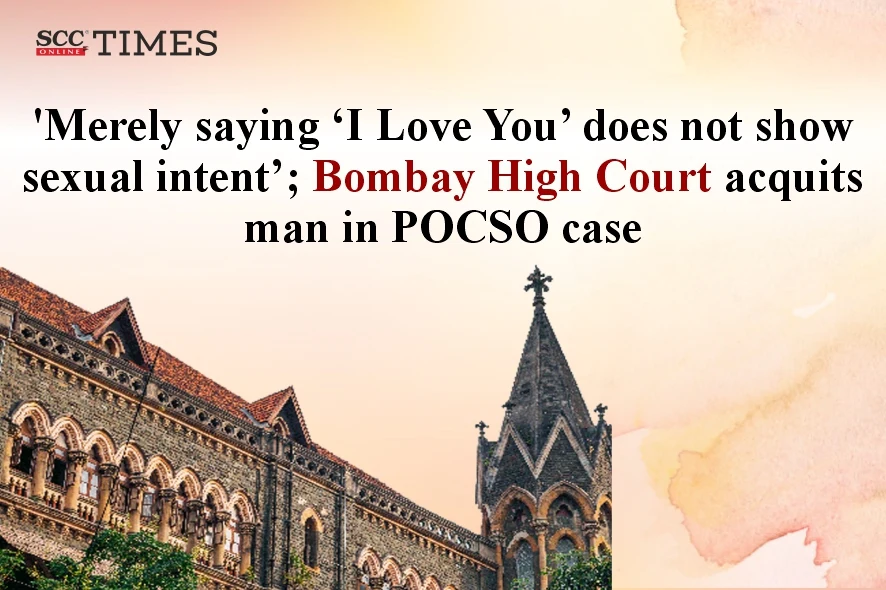Bombay High Court: The present appeal was filed by the appellant-accused, challenging the judgment and order dated 18-8-2017 passed by the Additional Sessions Judge, Nagpur, whereby he was convicted for offences under Sections 354-A(i) of the Penal Code, 1860 (‘IPC’) and Section 8 of the Protection of Children from Sexual Offences Act, 2012 (the ‘POCSO Act’). A Single Judge Bench of Urmila Joshi Phalke, J., allowed the appeal and set aside the conviction of the accused, observing that there was not a single circumstance indicating that the accused’s real intention was to establish sexual contact with the victim. Further, the Court opined that “intention” was an inner compartment of a person’s mind and thus, the appellant merely saying the words ‘I love you’, did not show that he uttered them with sexual intent.
Background:
The present case arose from a complaint lodged on 23-10-2015 by a 17-year-old minor girl-victim, alleging that while she was returning home with her cousin near an agricultural field, the accused who was also from the same village, approached her on a motorcycle, held her hand, insisted on knowing her name and said ‘I Love You’. She escaped and disclosed the incident to her father which led to the registering of the FIR under Section 354-A(i) and 354-D(1)(i) IPC and under Section 8 of the POCSO Act. The Trial Court appreciated the evidence of record and held the accused was guilty and thus, he was sentenced to undergo rigorous imprisonment for 3 years and to pay fine of Rs 5000, and in default, to undergo simple imprisonment for two months.
The accused filed an appeal after being aggrieved and dissatisfied with the conviction and alleged that due to previous enmity he was implicated in the said offence. He argued that the age of the victim was not proved and the birth certificate attached was not the valid document as it was nowhere mentioned who had given the information about the date of birth to the Nagar Parishad and, therefore, the said evidence was not sufficient to prove the age of the victim.
Analysis and Decision:
The Court stated that to attract the offence under Section 354-A IPC, the prosecution had to establish that there was a physical contact by the accused with a “sexual intent” or a “demand” or a “request” for sexual favour or “making sexual coloured remarks”, which were absent in the present case. Further, the charge under Section 354-D IPC was not established due to lack of evidence, to show that the accused repeatedly followed the victim to force personal interaction despite her clear disinterest. The Court opined that all the ingredients of Sections 7 and 8 of POCSO Act were absent in the present case.
The Court observed that the age of the victim was duly proved through a birth certificate placed, which was held to be a valid and admissible document issued under the provisions of the Registration of Births and Deaths Act, 1969 and further said that such a document was a public document under Section 74 of the Evidence Act, 1872 (‘the 1872 Act’) and was admissible under Section 77 of the 1872 Act.
The Court examined whether that sole incident by itself amounted to commission of offence punishable under Section 354-A or 354-D IPC as well as 8 of the POCSO Act or not. The Court emphasised that sexual assault included unwanted touching of private parts, forced kissing, or other sexual contact with a woman and modesty involved acts that were offensive, indecent, or degrading to a woman’s sense of decency and morality. The Court further observed that for the offence of stalking under Section 354-D IPC, there should be following of a woman and contacting her or attempting to contact her to foster personal interaction repeatedly despite a clear indication of disinterest by such a woman, or monitoring of the use by a woman of the internet, email, or any other form of electronic communication.
The Court noted that the allegations made against the accused were that he had approached the victim and contacted her only once, insisted that she disclose her name, and said “I love you”. The Court held that a bare perusal of the evidence presented by the prosecution witnesses did not reveal that the words ‘I love you’ had been uttered with sexual intent. The Court further added that “intention” was an inner compartment of a person’s mind and had to be determined from surrounding facts and circumstances and if someone said he was in love with another person or expressed his feelings, it did not by itself amount to an “intent” indicating his sexual intention and what constituted such “sexuality” or “sexual intent” and what was not, was a question of fact.
The Court held that, in order to ascertain the state of mind of the accused, there was not a single circumstance indicating that his true intention was to establish sexual contact with the victim. Furthermore, there was no evidence on record demonstrating any gesture in the nature of eye expression or body language by the accused and also, the utterance in question was not made repeatedly, it was made only once. The Court further observed that the offence under Section 8 of the POCSO Act was not made out, as there had been no allegation that the accused had, with sexual intent, touched the private parts of the victim as described under Section 7 of the POCSO Act involving physical contact.
The Court allowed the appeal and observed that the conviction made by the Trial Court was erroneous and further held that the offences under Sections 354-A and 354-D IPC, as well as under Section 8 of the POCSO Act, were not made out against the accused.
[Ravindra v. State of Maharashtra, 2025 SCC OnLine Bom 2530, decided on 30-6-2025]
Advocates who appeared in this case :
For the Appellant: Sonali Khobragade, Counsel
For the Respondent-State: M.J. Khan, Additional Public Prosecutor




